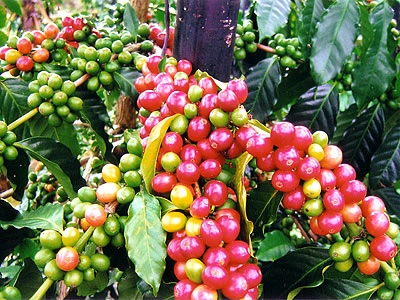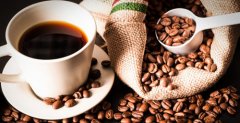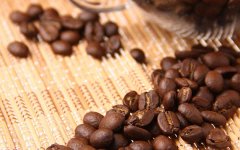Introduction to Coffee beans-- Yunnan small Coffee Origin Yunnan Coffee characteristics Cloud

Origin:
In 1892, French missionary Father Tian successfully planted coffee in a place called Zhukula in Yunnan Province. Up to now, there are still 24 coffee trees growing in Zhukula Township, which are more than 90 years old.
Zhukula is a mysterious, legendary and beautiful natural village, belonging to Zhukula Village Committee of Pingchuan Town, Binchuan County, Dali Prefecture. It is located on the bank of Yupao River, a tributary of Jinsha River. This is a place where Dali Prefecture, Chuxiong Prefecture and Lijiang City meet.
More than 100 years ago, Zhu Kula was called "Ruokelai"(Yi language), which means curved mountain road. In 1892, due to the arrival of French missionary Father Tian, the essence of Yi language and French romance were combined, so there was the name Zhu Kula, which later generations translated as "heaven on earth".
According to reports, in 1892, French missionary Father Tian used coffee fruit to breed the first coffee tree outside the church door in order to drink coffee himself, and then cultivated more coffee trees and planted them around the church. Since then, Jukula village began coffee cultivation, and the village has been surrounded by coffee trees ever since. Qi Guanghui and Li Fusheng, the two oldest elders in the village, are both in their eighties this year. Together, they witnessed the formation of China's oldest coffee forest.
Although Zhukula is poor and backward, it is a place that has an indissoluble bond with coffee. In addition to the cultivation of coffee by the whole people, the villagers have a tradition of drinking coffee: self-cultivation, self-grinding, self-cooking, and now the village has the habit of drinking coffee regardless of men, women and children. Villagers here have a special feeling for coffee trees. Even if coffee beans do not bring them any economic benefits, villagers are reluctant to cut down a coffee tree.
Zhukula Village receives guests with local coffee and walnuts. Although the coffee brewed in earthen pots does not taste the best, this primitive drinking method reflects the villagers 'love for coffee and is also the highest courtesy reception for guests. The unique and rich original ecological coffee culture makes everyone who knows Zhu Kula have to sigh. It deserves to be called the first coffee village in China.
Zhukula coffee forest belongs to Arabica, bourbon and Typica varieties.
Yunnan now has more than 21,000 hectares of Arabica coffee plantations.
Primary Origin:
Arabica coffee is suitable for growing in the mountains of 800~1800 meters above sea level. If the altitude is too high, it tastes sour, and if it is too low, it tastes bitter. Arabica coffee is mostly planted in dry and hot valley areas at an altitude of 1100 meters, so the acidity is moderate, the flavor is rich and mellow. Many areas of Yunnan Province have unique environments suitable for the growth of Arabica coffee, and the Arabica coffee produced is of excellent quality.
Planting areas are mainly distributed in Lincang, Baoshan, Simao, Xishuangbanna, Dehong and other prefectures.
The average temperature of Lujiang Dam in Baoshan is 21.5℃, the highest is 40.4℃, and there is basically no frost all year round. The Arabica coffee cultivated here is strong but not bitter, fragrant but not strong, well-proportioned in small particles, mellow and fruity, and is recognized as the best Arabica coffee producing area. The Arabica coffee cultivated here is famous for its strong but not bitter, fragrant but not strong, well-proportioned grain facets, mellow fragrance and fruity flavor.
After inspecting Yunnan coffee planting and primary processing bases, experts from the International Coffee Organization evaluated Yunnan coffee as Colombia wet-processed Arabica coffee, which is the highest quality coffee in the world.
Breed:
Typica and Bourbon, two classic coffee varieties, are the main cultivars of Yunnan coffee. In 1991, Katimo Catimor series varieties (stronger virus resistance and higher yield) were introduced from Kenya. A variety of Arabian species (also known as small species). Because of the similarity of morphology and habits of these two varieties, they are often mixed and cultivated.
Tibica coffee is native to Ethiopia and southeastern Sudan and is the most widely cultivated coffee variety in the Western Hemisphere. The plants are more robust, but less tolerant to light, and yield more in Hawaii. The top leaf of Tibika is red copper color, which is called red top coffee.
Popan coffee is the second most common variety of Arabica coffee after tipica. The main branch and trunk initially grow upward at 45 degrees, drooping with fruit load, the branch nodes are dense, the results are more, and the yield is higher. But the berries are smaller and ripen slower. Bobang bud tender leaves are green, called green top coffee;
Catimor is an improved variety of the Tibica species, with 25% of the Robusta gene.
From the botanical point of view of coffee, Yunnan Arabica coffee and recognized as the best Jamaica Blue Mountain (Jamaica Blue Mountain), Hawaii Kona (Kona) have genetic similarity.
Growth period:
Coffea arabica berry Yunnan Coffea arabica 3~4 years old fruiting tree.
Coffee is a short-day plant. Coffee has the characteristics of multiple flowering and concentrated flowering. Coffea arabica flowers from February to July and blooms from March to May in Yunnan. The flowering of coffee is greatly affected by climate, especially rainfall and temperature. Coffee flower life is short, only 2 - 3 days. Arabica coffee generally opens at 3 to 5 in the morning and blooms at 5 to 7.
Coffee fruits take longer to develop. Coffee arabica ripens in 8~10 months, usually in October ~ December of the year. Rainfall has a great influence on fruit development, and climate conditions directly affect fruit development.
Luka Jiangba small coffee fruit main components:
The percentage of main components in Lukajiangba granules was: crude fat 17.1, reducing sugar 0.93, starch 3.07, nitrogen 2.27, crude protein 1.419, ash 3.70, crude fiber 19.33, caffeine 2.14, sucrose 9.20, moisture 6.87. The quality was very good.
Important Notice :
前街咖啡 FrontStreet Coffee has moved to new addredd:
FrontStreet Coffee Address: 315,Donghua East Road,GuangZhou
Tel:020 38364473
- Prev

Introduction to boutique coffee beans: lemon Queen Ethiopia Yega Sheffield Coffee
Yega Xuefei as an entry-level coffee beans, not how many times it is, but such a price, such a distinct character and taste, as long as it is not too bad bean baker, you know, immediately out of the oven, you can immediately drink the first cup of quality coffee with character. Yega coffee Yega beans are divided into five grades, and the more common beans are Yeh.
- Next

Introduction of Fine Coffee beans-- Ames King Mantenin Fine Coffee Manteau Coffee Variety
Indonesia Manning Coffee is a world-famous coffee, which is low, rich, bitter, sticky and rich in texture. The unique coffee with woody flavor is loved by many coffee lovers, and it will be unforgettable as long as it is touched once. What we bring to everyone today is Aceh Gold from Sumatra, the hometown of Manning in Indonesia. There is a place called Sumatra in Indonesia.
Related
- Detailed explanation of Jadeite planting Land in Panamanian Jadeite Manor introduction to the grading system of Jadeite competitive bidding, Red bid, Green bid and Rose Summer
- Story of Coffee planting in Brenka region of Costa Rica Stonehenge Manor anaerobic heavy honey treatment of flavor mouth
- What's on the barrel of Blue Mountain Coffee beans?
- Can American coffee also pull flowers? How to use hot American style to pull out a good-looking pattern?
- Can you make a cold extract with coffee beans? What is the right proportion for cold-extracted coffee formula?
- Indonesian PWN Gold Mandrine Coffee Origin Features Flavor How to Chong? Mandolin coffee is American.
- A brief introduction to the flavor characteristics of Brazilian yellow bourbon coffee beans
- What is the effect of different water quality on the flavor of cold-extracted coffee? What kind of water is best for brewing coffee?
- Why do you think of Rose Summer whenever you mention Panamanian coffee?
- Introduction to the characteristics of authentic blue mountain coffee bean producing areas? What is the CIB Coffee Authority in Jamaica?

